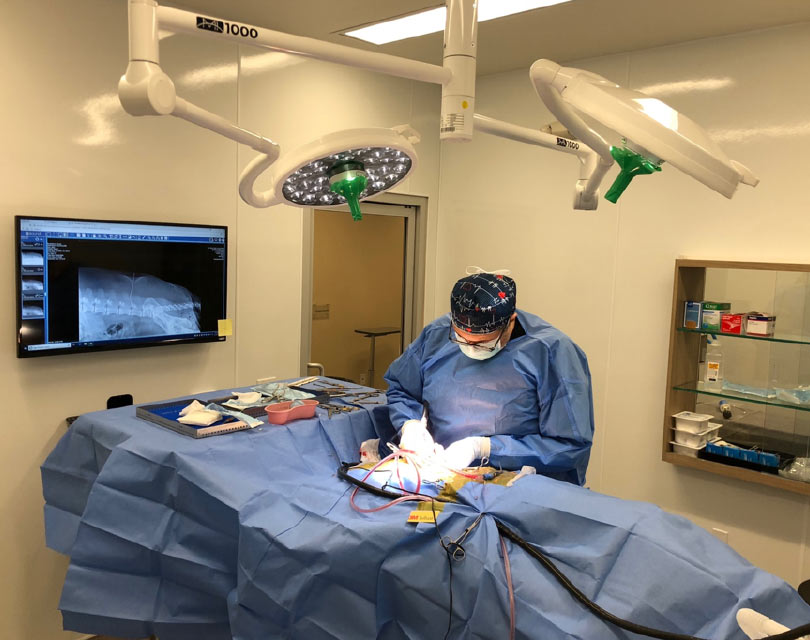With proper diagnosis and case selection, a veterinary neurologist that is an experienced expert in the field can treat your pet’s neurological condition. At BrightCare Animal neurology, the majority of the cases have a favorable outcome.

Symptoms of Vestibular Disease
It can be difficult to detect vestibular disease until it has progressed into its later stages. Since older dogs and cats are more likely to be afflicted with the condition, pet owners should be more watchful of their aging animals. Animals who have a family history of neurological illnesses are also at a higher risk of developing vestibular disease. If you suspect your pet may have vestibular disease, be on the lookout for:
- Disoriented, spastic, sideways gait
- Vertigo, dizziness
- Lethargy
- Inability to walk or look straight
- Nystagmus (jerky eye movements)
- Tinnitus
- Poor depth perception
- Head tilting
- Hearing loss
- Confusion
- Difficulty seeing
- Clumsiness
- Light sensitivity
- Nausea and vomiting
Causes of Vestibular Disease
Vestibular disease is caused by a problem with the nerves of the inner ear or the brainstem. Factors that can affect these parts of the nervous system include ear infections, exposure to certain chemicals, strokes, trauma, injury, genetics, congenital defects, and hyperthyroidism. There also may be too much pressure on the nerves on the ear, causing it to malfunction. It’s not uncommon for veterinarians to diagnose pets with idiopathic vestibular disease as well. This means there is no definitive cause of the problem.
Vestibular disease is a neurological condition that impairs the function of the vestibular system. The vestibular system controls coordination, hearing, and balance in relation to gravity. It consists of part of the brain and inner ear. Cats and Dogs who suffer from vestibular disease often struggle to maintain their ability to walk straight and focus with their eyes. It is more common in older animals, but the cause can vary with every case.
Diagnosis for Vestibular Disease
Vestibular disease characterizes a number of symptoms, but it does not specify an exact cause. There are many reasons your dog or cat may be suffering from the disorder. A veterinarian can help determine what is not causing the problem in order to narrow down what may be causing.
After reviewing your pet’s medical history and asking you a few questions about its current condition, your veterinarian will typically perform a comprehensive physical exam to diagnose whether your pet has vestibular disease or not. If the cause of vestibular disease is a serious problem like an injury or a stroke, the doctor may want to investigate further with more tests or x-rays. Vestibular disease is not a lifelong or life-threatening illness, however, so conducting a full panel of diagnostic tests is not mandatory.
Treatment
The vet neurologist will prescribe treatment based on the cause of the disease. Antibiotics can be used to treat ear infections. Inflammation or injury can be eased with medicine or surgery. Vestibular disease is not traditionally a painful or harmful condition. Often, the problem will resolve itself, but if your pet feels uncomfortable, nauseous, or dizzy, the vet can prescribe anti-nausea medication. In severe cases, intravenous fluids can be used to prevent animals from dehydration and malnutrition if they are too dizzy to eat or walk on their own. Your cat or dog’s condition should improve within two weeks. If not, take them back to the veterinarian for treatment.
Prevention
It’s very difficult to predict what exactly is going to vestibular disease, but there are a few ways pet owners can minimize risk for their pets. A healthy diet, regular exercise, and proper hygiene are obvious ways to prevent diseases of any kind. To prevent vestibular disease, pet owners should keep their pets’ ears clean. There is a delicate balance of bacteria in the ears that shouldn’t be disturbed, so pet owners should avoid using harsh chemicals or overcleaning as well. As usual, pet owners should also be taking care that their pets aren’t involved in any accidents that could result in trauma to the head.
No matter how careful pet parents are, there’s no way to completely stop accidents happening or genetics from affecting your pet. What you can do is keep an eye on your pet if you notice any odd behaviors. Treating the problem before it progresses is key to a successful outcome. If you believe your dog or cat has vestibular disease, call the vet as soon as possible.
At BrightCare Animal Neurology & Imaging, our veterinary neurologist treats animals with all types of neurological disorders like vestibular disease. You can count on our experts to help you diagnose and treat your pet at our state-of-the-art facility. To learn more about vestibular disease, head over to our blog about what vestibular disease is.

